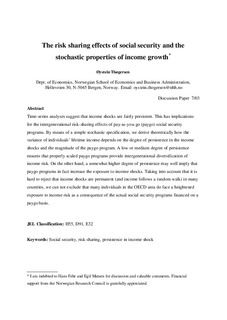| dc.contributor.author | Thøgersen, Øystein | |
| dc.date.accessioned | 2006-08-08T07:19:13Z | |
| dc.date.available | 2006-08-08T07:19:13Z | |
| dc.date.issued | 2003-05 | |
| dc.identifier.issn | 0804-6824 | |
| dc.identifier.uri | http://hdl.handle.net/11250/162856 | |
| dc.description.abstract | Time-series analyses suggest that income shocks are fairly persistent. This has implications
for the intergenerational risk-sharing effects of pay-as-you- go (paygo) social security
programs. By means of a simple stochastic specification, we derive theoretically how the
variance of individuals’ lifetime income depends on the degree of persistence in the income
shocks and the magnitude of the paygo program. A low or medium degree of persistence
ensures that properly scaled paygo programs provide intergenerational diversification of
income risk. On the other hand, a somewhat higher degree of persistence may well imply that
paygo programs in fact increase the exposure to income shocks. Taking into account that it is
hard to reject that income shocks are permanent (and income follows a random walk) in many
countries, we can not exclude that many individuals in the OECD area do face a heightened
exposure to income risk as a consequence of the actual social security programs financed on a paygo basis. | en |
| dc.format.extent | 57249 bytes | |
| dc.format.mimetype | application/pdf | |
| dc.language.iso | eng | en |
| dc.publisher | Norwegian School of Economics and Business Administration. Department of Economics | en |
| dc.relation.ispartofseries | Discussion paper | en |
| dc.relation.ispartofseries | 2003:7 | en |
| dc.subject | social security | en |
| dc.subject | risk sharing | en |
| dc.subject | persistence in income shock | en |
| dc.title | The risk sharing effects of social security and the stochastic properties of income growth | en |
| dc.type | Working paper | en |
